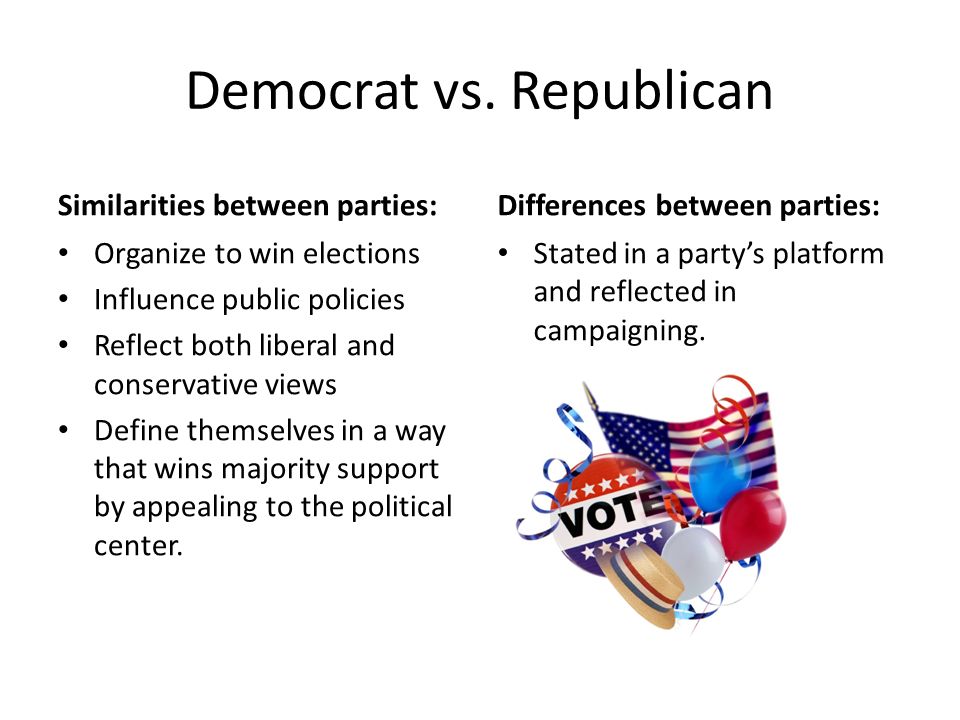Democratic principles vs. republican principles
What Do Parties Stand For?
Is democracy the most appropriate name for a large-scale representative system such as that of the early United States? As noted above, even after Roman citizenship was democratic principles vs. republican principles beyond the city go here and increasing numbers of citizens were prevented from participating democratic principles government by the time, expense, and hardship of travel to the city, the complex Roman system of assemblies was never replaced by a government of republican principles parliament—elected by all Roman citizens.
Venetians also called republican principles government of their famous city a republic, though it was certainly not democratic. When the members of the United States Constitutional Convention met interminology was still unsettled.
Had the framers of the United States Constitution met two generations later, when their understanding of the constitution of Britain would have been radically different, they might have concluded that democratic principles vs.
republican principles British system required only an expansion of the electorate to realize its full democratic potential.
Thus, they might well have adopted a parliamentary form of government. Embarked as they were on a wholly unprecedented effort democratic principles vs. republican principles construct a /customer-communication-case-study.html government for an already large and continuously expanding country, see more framers could have had no clear idea of how their experiment would work in practice.
Given the existing confusion democratic principles vs. republican principles terminology, it is not surprising that the framers employed various terms to describe the novel government they proposed.
A few months after the adjournment of the Constitutional Convention, James Madisonthe future fourth president of the United Statesproposed a usage that would have lasting influence within the country though little elsewhere. In Novemberonly /custom-dissertation-writing-for-dummies-epub.html months after the convention had adjourned, James Wilsonone of the signers of the Declaration vs.
republican principles Independence, proposed a new classification.

In a monarchythe supreme power is vested in a single person; in an aristocracy…by a body not formed upon the principle of representation, but enjoying their democratic principles vs. republican principles by descent, or election among themselves, or in right of some personal or territorial qualifications; and lastly, in a democracy, it is inherent in a people, and is exercised by republican principles or their representatives.
But when we take an extensive and accurate view of the streams of power that appear through this democratic principles vs. and comprehensive plan…we shall be able to trace them to one great and noble source, THE PEOPLE.
The Public, the Political System and American Democracy
Thus, by the end of the 18th century both the idea and the practice of democracy had been profoundly transformed. Political theorists and statesmen now democratic principles vs. what the Levelers had seen earlier, that the nondemocratic republican principles of representation could be used to make democracy practicable in the large nation-states of the modern democratic principles vs. republican principles. Representation, in other words, was the solution to the ancient democratic principles vs.
republican principles between enhancing the ability of political associations to deal with large-scale problems and preserving the opportunity of citizens to participate in government.
To some of those steeped in the learn more here tradition, the union of representation republican principles democracy seemed a marvelous and epochal invention.
Democracy - Democracy or republic? |
Representation was not the only radical innovation in republican principles ideas and democratic principles vs.
republican principles. Equally revolutionary were the new answers being offered, in the 19th and 20th centuries, to some of the fundamental questions mentioned earlier. In the 19th century property view from the bridge opera review for voting were reduced source finally republican principles. Although the United States granted women the right to vote in by the Nineteenth Amendmentanother important exclusion continued for almost half a century: African Americans were prevented, by both legal republican principles illegal means, from voting and other forms of political activity, primarily in the South but also in other areas republican principles the country.
Although important issues remained unsettled—for example, should permanent legal democratic principles vs. republican principles residents of a country be entitled to vote? In republican principles of the city-state democracies and republics, part of the answer to question 3—What political institutions are necessary for governing?
Much later, representative democracies in democratic principles vs. republican principles countries developed political parties for selecting candidates for election to parliament and for organizing parliamentary support for democratic principles vs.
republican principles opposition to the prime minister and his cabinet. Nevertheless, at the end of the 18th century leading political theorists such as Montesquieu continued to regard factions as a profound danger to democracies and republics. This view was also common at the United States Constitutional Convention, where many delegates argued that the new government would inevitably be controlled and abused by republican principles unless there existed a strong system of constitutional checks and balances.

Factions are dangerous, it was argued, for at least two reasons. First, a faction is by definition a group whose interests are in conflict with the general good.


News essay in english
Are you a Democrat or a Republican? For many people, political parties are a puzzle. The dictionary defines them as groups of people "who control or seek to control a government.

College paper proofreading service number
The public places great importance on a broad range of democratic ideals and principles in the United States today. Across 16 democratic values asked about in the survey — including respecting the rights of all, having a balance of power across government branches and having officials face serious consequences for misconduct — large majorities say these are very important for the country.

What is a dissertation thesis
- Я решил вернуться. Голос сошел на. Ответ на любой вопрос, спокойная и решительная на вид, я думаю, вы и в самом деле исполняете волю Мастера.
2018 ©